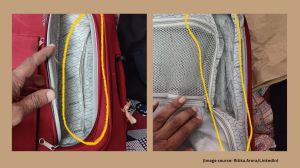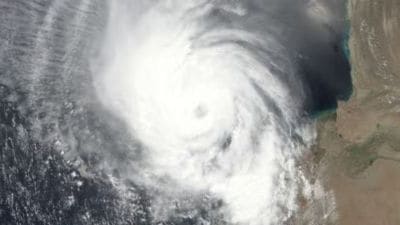The protests in Bangladesh against the quota for freedom fighters’ families in government jobs has escalated over the last week, since Hasina’s statement on July 14 — “If the grandchildren of the freedom fighters don’t get quota benefits, should the grandchildren of Razakars get the benefit?” — sparked outrage among young protestors in the country.

The bone of contention is the 30 per cent quota reserved for families of Bangladesh freedom fighters in the country’s government jobs. Protesters say these are discriminatory as they benefit families of ruling Awami League which dons the mantle of the freedom movement. Protestors want the quotas to be scrapped.
 The Border Security Force (BSF) welcomed the students fleeing the tension in Bangladesh. (Express Photo)
The Border Security Force (BSF) welcomed the students fleeing the tension in Bangladesh. (Express Photo)
Significantly, about 4 lakh candidates apply for some 2,000-3,000 government jobs every year. But the large-scale mismatch in demand and supply in the job market in Bangladesh is one aspect of the challenge.
At the heart of the protests lies the contestation between those aligned with the Awami League and those who are not. This is linked to the politics of history and identity in Bangladesh divided along the deep faultline of descendants of freedom fighters and the 1971 Liberation war veterans and those who oppose the ruling Awami league, led by Hasina.
 The term ‘Razakar’ is considered to be a derogatory term in the country and is associated with atrocities committed during the Bangladesh Liberation War, also known as the Bangladesh War of Independence in 1971. (Reuters)
The term ‘Razakar’ is considered to be a derogatory term in the country and is associated with atrocities committed during the Bangladesh Liberation War, also known as the Bangladesh War of Independence in 1971. (Reuters)
Hasina has defended the quota system, saying that veterans deserve the highest respect for their contributions to the war, regardless of their political affiliation. There have been claims by the Awami League that some of the protesters are backed by the Opposition BNP and the banned Jamaat-e-Islami Bangladesh. Using 1971 to push the Opposition into a corner isn’t new in the winner-takes-all politics of Bangladesh. But Hasina, whose government has cracked down on the Opposition over the last 17 years in power, is also dealing with the reality that an estimated two-thirds of the population was born after 1971. So, for the vast majority, the 1971 liberation war and the freedom struggle that started with the 21st February language movement is part of history and their parents’ memory. That’s why Hasina’s invoking of history and the Awami League’s lacks resonance among the youth who have hit the streets.
 Members of Border Guard Bangladesh (BGB) and the police work to control the protesters outside the state-owned Bangladesh Television as violence erupts after anti-quota protests by students, in Dhaka, Bangladesh, July 19, 2024. REUTERS
Members of Border Guard Bangladesh (BGB) and the police work to control the protesters outside the state-owned Bangladesh Television as violence erupts after anti-quota protests by students, in Dhaka, Bangladesh, July 19, 2024. REUTERS
That is the conflict which the Bangladesh government finds itself with the protesters, who are questioning the legacy of the freedom fighters. And they have owned the “Razakar” label — with the slogan “chaite gelam Adhikar, hoye gelam Razakar” (we sought our rights, we became Razakar).
Story continues below this ad
However, a senior official in the Bangladesh government told The Indian Express that only 10% of jobs under the 30% quota for the freedom fighters’ families get filled, the rest goes to the merit-based system.
In all, 56% of government jobs were reserved for various quotas: 30% for families of freedom fighters, 10% for women, 10% for people from underdeveloped districts, 5% for indigenous communities, and 1% for persons with disabilities.
In 1996, as the number of freedom fighters’ quota claimants dwindled, the government extended the quota to include children of freedom fighters and, in 2009, it was further expanded to include grandchildren of freedom fighters.
In 2018, amid protests by job-seeking students, the Hasina government scrapped all quota facilities for first-class and second-class government jobs.
Story continues below this ad
On June 5 this year, the High Court ruled that the 2018 government circular abolishing the quota system was illegal, effectively reinstating the quota system.
The government appealed the decision, and the Appellate Division issued a status quo on the High Court order. Following this, students once again took to the streets, protesting across the country and demanding reform of the quota system.
Protests have escalated since Hasina’s statement on July 14, and there were violent clashes between the protesters and the police. Now, the Bangladesh government has brought in the Army to impose a curfew and a complete internet shutdown so much so that media outlets are unable to even update their websites.
 Members of Border Guard Bangladesh (BGB) stand guard in front of the state-owned Bangladesh Television, next to a burned auto-rickshaw, as violence erupts across the country after anti-quota protests by students, in Dhaka, Bangladesh, July 19, 2024. (REUTERS)
Members of Border Guard Bangladesh (BGB) stand guard in front of the state-owned Bangladesh Television, next to a burned auto-rickshaw, as violence erupts across the country after anti-quota protests by students, in Dhaka, Bangladesh, July 19, 2024. (REUTERS)
Bangladesh soldiers, a Reuters report said, patrolled the deserted streets of Dhaka Saturday during a curfew. A suspension on internet and text message services has remained in place since Thursday, cutting off Bangladesh from the world. Overseas telephone calls mostly failed to connect while websites of Bangladesh-based media organisations did not update and their social media handles remained inactive.
Story continues below this ad
For Dhaka, the best case scenario will be the Supreme Court’s decision to scrap — or, at least, stay — the quotas, which can become a face-saver for the government. That is likely to be a possible scenario, according to observers.
New Delhi’s mission in Dhaka has asked Indian nationals living in Bangladesh to avoid travel and minimise their movement. It has been careful not to comment on the turmoil since Hasina is one of the “most reliable” leaders in the neighbourhood – she was the first head of state to visit India in the third term of the Modi government.
So, while it is quietly trying to assist its own nationals and their repatriation to India, MEA spokesperson Randhir Jaiswal described the violent protests in Bangladesh as an “internal” matter. Around 15,000 Indians including 8,500 students are currently residing in Bangladesh. “We remain committed to providing all possible assistance to our nationals in Bangladesh,” Jaiswal said.



 The Border Security Force (BSF) welcomed the students fleeing the tension in Bangladesh. (Express Photo)
The Border Security Force (BSF) welcomed the students fleeing the tension in Bangladesh. (Express Photo)
 The term ‘Razakar’ is considered to be a derogatory term in the country and is associated with atrocities committed during the Bangladesh Liberation War, also known as the Bangladesh War of Independence in 1971. (Reuters)
The term ‘Razakar’ is considered to be a derogatory term in the country and is associated with atrocities committed during the Bangladesh Liberation War, also known as the Bangladesh War of Independence in 1971. (Reuters) Members of Border Guard Bangladesh (BGB) and the police work to control the protesters outside the state-owned Bangladesh Television as violence erupts after anti-quota protests by students, in Dhaka, Bangladesh, July 19, 2024. REUTERS
Members of Border Guard Bangladesh (BGB) and the police work to control the protesters outside the state-owned Bangladesh Television as violence erupts after anti-quota protests by students, in Dhaka, Bangladesh, July 19, 2024. REUTERS Members of Border Guard Bangladesh (BGB) stand guard in front of the state-owned Bangladesh Television, next to a burned auto-rickshaw, as violence erupts across the country after anti-quota protests by students, in Dhaka, Bangladesh, July 19, 2024. (REUTERS)
Members of Border Guard Bangladesh (BGB) stand guard in front of the state-owned Bangladesh Television, next to a burned auto-rickshaw, as violence erupts across the country after anti-quota protests by students, in Dhaka, Bangladesh, July 19, 2024. (REUTERS)





